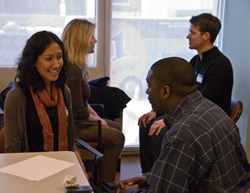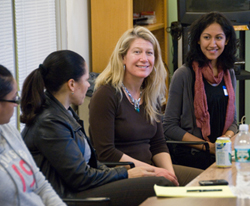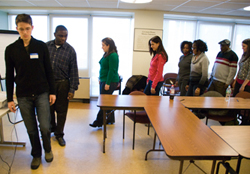Helping Those Who Are Helping Homeless Youth
Funded by Goldman Sachs, TC psychology students and alumni are providing training to Covenant House staff
That’s why, one chilly afternoon this past February, Sofia Jasani, a yoga instructor and first year Master’s student in TC’s Clinical Psychology program, was modeling a “mindfulness” exercise for 20 staff members at Covenant House New York, an organization that provides shelter and support services for the city’s homeless youth population.
“I am aware of a horn honking outside,” Iasani said, her eyes closed. “The fan. The chair. My toes in my boots. I am aware of the tightening in my shoulders, what my voice sounds like in a room full of people. I am aware of my breath. Aware of feeling a little bit nervous and a little happy. Aware of the sirens.”
Jasani’s workshop is just one facet of Youth Rising, a larger TC program to help Covenant House staff address the psychological, psychiatric, and educational needs of the City’s more than 12,000 homeless youth. Created by Lisa Miller, TC Associate Professor of Psychology and Education, Youth Rising recently received a two-year $170,000, grant from the Goldman Sachs Foundation.
The Goldman Sachs seed funding will support the expansion of staff trainings and also a direct service component, in which advanced TC doctoral students will facilitate mental health and wellness groups for homeless youth. The groups will focus on coping with extreme stress, strength-building and resilience, and facilitators will receive supervision from experienced clinicians, many of whom are graduates of TC’s clinical psychology program. Youth Rising’s project coordinator is TC doctoral student Biagio Mastropieri, who will work directly with youth and develop the program’s services.
Some of the work is modeled after groups that have been conducted by other investigators, such as Myrna Weissman at Columbia’s College of Physicians and Surgeons, for survivors in war torn countries such as Uganda.
Youth Rising reflects intellectual and service contributions coming from a range of departments across Teachers College and Columbia University, including the College of Physicians and Surgeons and the School of Social Work. Dinelia Rosa, Director of Teachers College Dean Hope Center for Educational and Psychological Services, will lead a staff training on cultural sensitivity. Sidney Hankerson, an expert at the College of Physicians and Surgeons on issues in minority mental health, conducted a series of staff trainings on depression and post-traumatic stress disorder.
“When you see these kids, the first inclination is to help,” says Miller. “There is no reason in a civilized society to have youth living on the street. This program is a great example of harnessing resources. Everyone has been so generous—there’s great synergy.”
Miller points out that unlike homeless adults, the majority of whom suffer from mental illness, homeless youth tend to be coping with issues that have been externally imposed—including, for more than a third, the fact that they have aged out of city-provided foster care.
“These youth are primarily healthy—they are escaping abuse and situational trauma,” she says. “These kids are full of inner resources,” says Miller. “You have to be pretty optimistic if you get on a bus and head to New York City to escape an abusive situation.”
Funding from the Goldman Sachs Foundation will also support the creation of a Commission on Youth Homelessness, comprised of top leaders from a broad range of fields across New York City, to include business, communications as well as academics from Teachers College and Columbia University. By late fall 2011, the commission is expected to come up with three to five actionable recommendations for the city to take—and some of those ideas may come directly from the work of Youth Rising.
“An important piece of what we’re trying to do is to build a model that can be expanded and replicated,” says Miller.
For now, helping Covenant House staff find some inner peace seems like a good place to start. Back in Jasani’s workshop, after the participants had sat still for a few minutes, breathing, a woman raised her hand.
“I felt very relaxed. I am tired and had a little bit of a headache. I don’t think I knew that.”
After a “walking meditation,” another staff person said, “I liked that it was about the here and now, not projecting into the future or thinking that five minutes ago I screwed up. I like the here and now very much.”
Published Monday, Mar. 28, 2011


